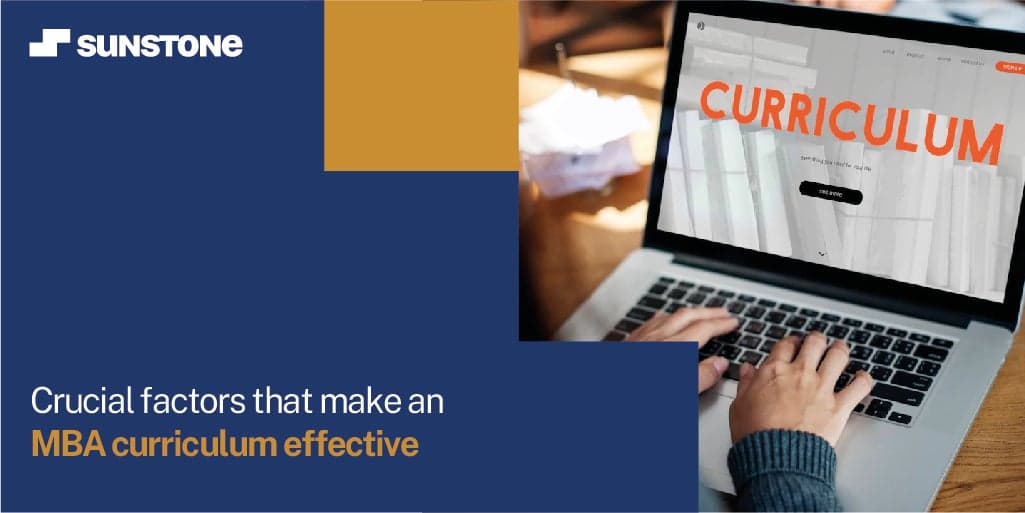5800 students unlocked their dream jobs with UG/PG programs in top colleges. Apply Now!
Want to pursue an MBA but feel the burden of having so many factors to consider? We understand your pain! The selection of an MBA program is not just about the right B school or course. There are actually several parameters we need to consider like placements, curriculum, ROI, etc. A good, state-of-the-art MBA curriculum is what ties all of these parameters together. Over the decades that the MBA has existed, some modules of the core curriculum have continued to define the differing MBA programs, whereas others have evolved to reflect a more modern management and business inclined approach. The list of important MBA concepts has only grown over the years as topics such as analytics and leadership have joined the list. The design of no two MBA curriculums is the same. While one MBA program may be suitable for a particular candidate, it might not be the perfect fit for another. So what should one look for in a curriculum when choosing an MBA program? ere we discuss the factors that make an MBA Curriculum effective and successful in equipping you with the right skills. Also read, Soft skills, the present demand of the business world
The Factors That Make The MBA Curriculum Effective
Keep in mind the following crucial factors as these are the constituents a good MBA curriculum cannot do without. A good curriculum does not comprise just content or just delivery, it is much more than that. Let us discuss further on this.
Core Curriculum
Core modules like finance, marketing, operations, etc. are those management concepts that lay the foundation for advanced electives and specialization. These specializations are something every B school student needs to select.
However, apart from having an array of MBA specializations, it is crucial for every B school to regularly review and revamp their program curriculum to prepare the business leaders of tomorrow.
For instance. In every era, marketing has evolved based on what the customer is using. History suggests that with the invention of the radio, there was a rise in radio advertisements and marketing also. The boom of the television was next, a device we still use extensively. Television then allowed the companies to reach a mass audience with TV ads. And now, in this advanced technological state smartphones, the internet, and computers have given rise to digital marketing. This goes to show how the industry is constantly evolving and growing. Nevertheless, with all this development academia hasn’t been able to keep up and deliver what the industry and corporates presently demand. Ensure that along with the latest specializations and electives the MBA curriculum may be offering, the core modules should be as per the industry requirements.
Delivery of MBA Curriculum
The MBA curriculum content is one side of the coin, the other side is good delivery of the content. The delivery of any content includes the faculty and the medium, such as technology, lecturing etc. It is a known fact that our teachers hold the power to make a difference in our lives and careers. Most MBA programs highly promote their faculties and attempt to seduce us with the thought of star professors. However, some B schools and MBA programs fail to mention that the time spent on media engagements, online sessions, virtual projects, etc. leads to never actually seeing the professors in the classroom. You can also read about the best MBA colleges in India with our blog. For students, to be able to apply their learnings, the curriculum should be taught in such a manner that the learner can retain the maximum information. Based on a lot of research, educationalists say that one learns the best by doing, in other words, experiential learning. Therefore, the content needs a delivery rich in learning methodologies that help a student learn and retain more. Case studies, self-assessment, peer-to-peer learning, problem-based learning, etc are techniques that are effective in helping students go beyond the basic learning methods. Hence, most importantly what you should make sure of is that the MBA curriculum is taught by faculty that have business exposure but more importantly, they should be approachable and good teachers. You can find this out by talking to alumni and old students.
Deep Industry Connect
The result of an MBA curriculum is to help the student enter the business world with in-depth field knowledge and skills applicable in the real world. You can also learn about the top management skills with our blog. The gap between industry expectations and what MBA graduates learn is widening. Yet the expectations are that these graduates are agile enough to meet these expectations. The business community acknowledges that corporations are powerful social actors. They have many implications for how business schools prepare the leaders of tomorrow. Inputs from industry experts are vital to any MBA program. These programs are making efforts to prepare a pool of talented aspiring managers. The MBA curriculum at Sunstone is an example of a curriculum that is designed in a manner that truly is, by the industry, for the industry.
Real World Internships
It is no secret that recruiters look into several aspects of the MBA curriculum of any B school before recruiting suitable graduates. Potential recruiters value the candidates’ experience, industry, years of experience, the B school, and MBA internships. Since many MBA graduates switch job functions or industry, the only factors the recruiters end up basing their decision on is the industry exposure and internship opportunity that the program and MBA curriculum has to offer. Therefore, make sure that there is a good period of internships integrated into the curriculum and program structure. This will not only help you gain real-world experience but will also let you apply your classroom learnings in the field.
Personal Interests & Career goals
The MBA is a versatile degree. The interests and goals of every person play an important role in driving a person towards success. Ask yourself, how much do you have to offer the program and vice-versa? You will get the most out of the program that has a community that you are most enthusiastic about joining and that you fit in best. So it is our advice that you are first clear in where you see yourself and doing what, and if it is in a corporate or having your venture, go for it! An MBA will help you align your career goals with your interests. In conclusion, Marc Anthony said, “ If you love what you do, you would not have to work another day in your life”. Find a B school and Management program that help you realize what it is you love doing. The MBA program should be a perfect fit for you and your skills along with being at par with industry demands. Only a good MBA curriculum can help you achieve all this and equip you with the right tools to take on the business world.
About Sunstone
Sunstone is a leading higher education service provider that works with academic institutions in up-skilling students for employability. Sunstone offers career-oriented training interventions for undergraduate and postgraduate students at 30+ institutions across 25 cities. Sunstone’s training programs are industry endorsed to enhance employability. These programs are designed for hybrid delivery with an unparalleled focus on soft skills and personality development. Sunstone’s focus is to provide students with a holistic educational experience.
Must Read
HELP
Take the first step towards your dream job.
ABOUT THE AUTHOR

